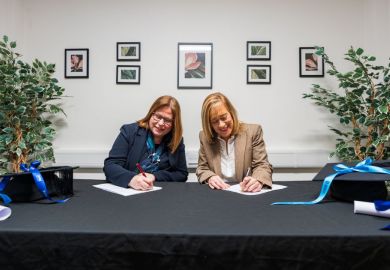With the world’s annual climate conference, COP26, in Glasgow this year, you would expect the UK’s top research-intensive universities to be leading the response to the climate emergency. After all, they can readily draw upon expert advice. They should be showing the way to becoming zero carbon institutions.
But ambitious targets drawn up a decade ago for English universities to cut carbon use by 43 per cent by 2020 have mostly been missed. In 2019 it was reported that less than a third of all UK universities were likely to meet this goal.
Data from the Higher Education Statistics Agency also show that the research-intensive universities of the Russell Group are the sector’s biggest polluters, responsible for more than half the gas and electricity emissions from estates and fleet vehicles in the sector.
With their older buildings and often sprawling estates, maybe this is unsurprising. But the carbon intensity (emissions per unit of energy used) for gas has not declined and the natural gas usage of the Russell Group has increased in the four years up to 2018-19, so these emissions continue to rise.
For electricity, there is some good news. Due to increases in renewables, the carbon intensity from the national grid has reduced by almost two-thirds since 2013. But this also means that any university has simply had to do nothing for the past eight years to see a significant drop in their electricity-related emissions. This is the main driver behind quoted reductions in university emissions, although you will not see this quantified in their publications. That said, there was no reduction in the total grid electricity consumption reported by the Russell Group over the four years up to 2018-19.
The third and most significant class of emissions covers goods, services and transport. A Carbon Trust report for Newcastle University estimated that these comprised more than 80 per cent of its total emissions, a figure similar to that given elsewhere. These emissions are not all easy to measure and hence reduce. Despite their importance only a handful of Russell Group universities have started to do so.
You can easily measure one of the largest sources of transport emissions, business air travel. But nearly all Russell Group universities have no specific public targets for reducing this. A recent analysis estimated that the largest individual cause of university carbon emissions was from international student air travel, but plans to address this are again almost universally absent.
Moreover, there is a noticeable lack of curiosity about the green impact of international students among research-intensive universities in the UK and further afield. None of the Russell Group’s 24 members has even tried to estimate the carbon emissions arising from their students studying abroad, let alone describe ways to reduce them. While educating international students is one of the best things universities do, they need to explain how it can be done sustainably.
Finally, with fossil fuels, a quarter of the Russell Group still have no commitment to complete divestment, and they are all silent on the huge investments they are effectively making through their contributions to the Universities Superannuation Scheme pension fund.
One attempt to assess sustainability more generally is through the international THE Impact Rankings, which relate to the UN Sustainable Development Goals (SDGs). Under SDG 13, climate action, two-thirds of the Russell Group have not submitted data. One-third have yet to sign up to the sector’s SDG accord.
What are the sector’s membership and regulatory bodies doing? Incredibly, universities are no longer required to provide environmental data to Hesa. The Office for Students has stated that it does not need these data. Carbon reduction proposals have been made to the OfS Board, but no action taken yet.
The Russell Group has promised a new sustainability network, and Universities UK recently hosted a climate crisis conference, but outcomes from these have not yet emerged. Why doesn’t UUK simply step up and set a sector-wide target such as net zero by 2030? Some progress has been made with an education climate commission and the COP26 universities network. Students and staff are also applying pressure.
Why is there so little progress overall? The real obstruction arises from the marketisation of higher education. Universities are forced to prioritise growth and profit. This creates the surpluses that can be reinvested to seek to outdo their competitors. Pressure is added by regular national assessments. Failure to compete risks a downward spiral.
The market system here, as in other sectors, drives profit-seeking expansion without penalties for environmental damage. Achieving major reductions in carbon emissions is costly overall, with little immediate benefit. It is easily pushed down the agenda.
Universities are not blind to the climate emergency, but only a minority have so far taken comprehensive action – UCL, Glasgow and Cambridge are some examples. But there is a lack of leadership at a number of universities where little action is being taken. Representative bodies are still thinking about what to do. As for the current UK government, many have little confidence in its competence, honesty and willingness to take real action.
The pandemic made it difficult for universities to address anything else in the past year. But they and their representative bodies now need to focus attention on the other, climate, emergency facing us all. In the interests of their students’ futures, it is critical to take immediate and effective action. But it is also an increasingly urgent question whether this is a realistic possibility without major changes to the current economic and political system.
Bill Spence is professor of theoretical physics at Queen Mary University of London.
Register to continue
Why register?
- Registration is free and only takes a moment
- Once registered, you can read 3 articles a month
- Sign up for our newsletter
Subscribe
Or subscribe for unlimited access to:
- Unlimited access to news, views, insights & reviews
- Digital editions
- Digital access to THE’s university and college rankings analysis
Already registered or a current subscriber?








